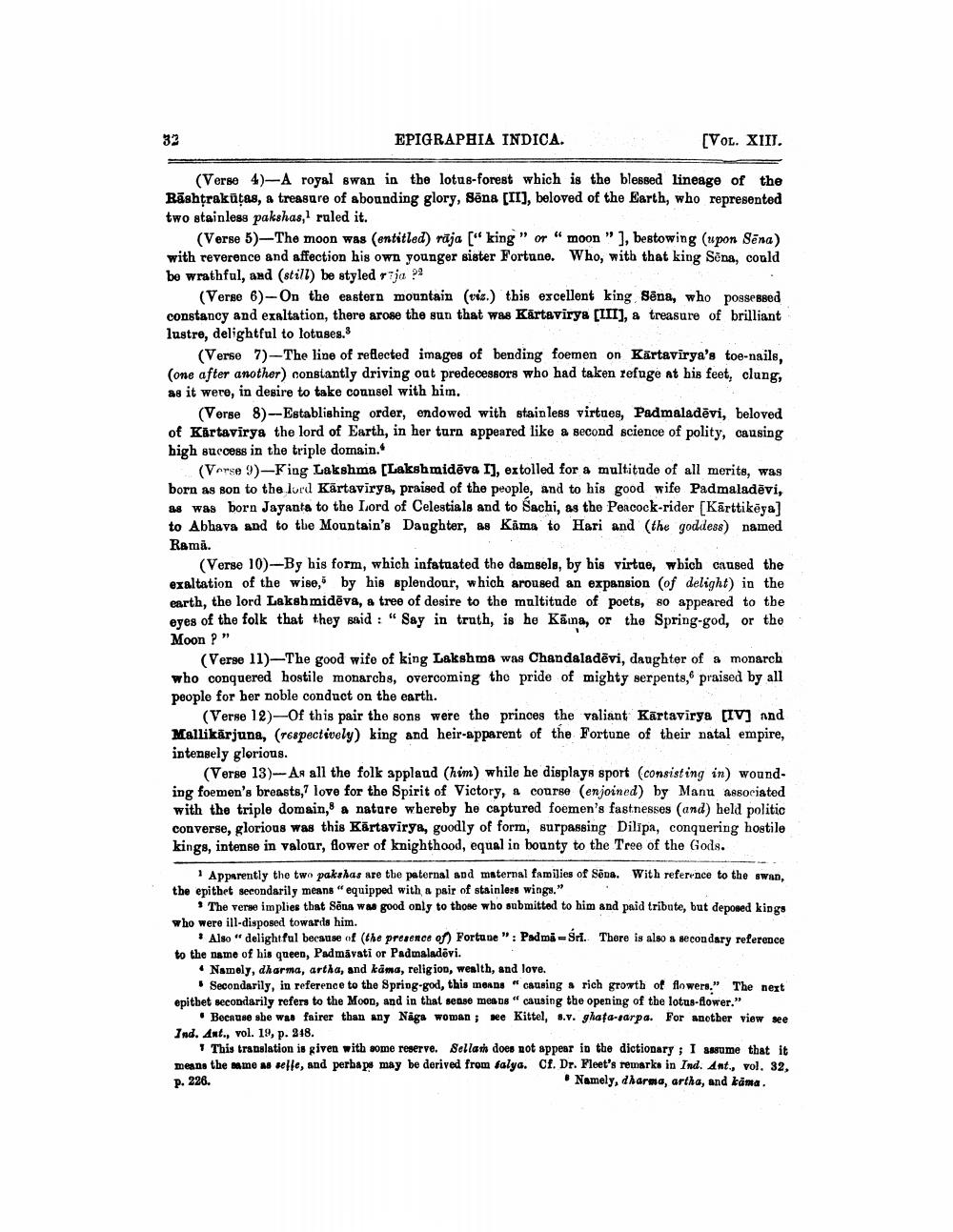________________
EPIGRAPHIA INDICA.
(VOL. XIIJ.
(Verse 4)- A royal swan in the lotus-forest which is the blessed lineage of the Rāshtrakūtas, a treasure of abounding glory, Sēna (II), beloved of the Earth, who represented two stainless pakshas, ruled it.
(Verse 5)-The moon was (entitled) rāja ("king" or "moon " ], bestowing (upon Sēna) with reverence and affection his own younger sister Fortune. Who, with that king Séna, could be wrathful, and (still) be styled rija
(Verse 6)-On the eastern mountain (viz.) this excellent king Sēna, who possessed constancy and exaltation, there arose the sun that was Kārtavirya [III], a treasure of brilliant lustre, delightful to lotuses.
(Verse 7)-The line of reflected images of bending foemen on Kärtavirya's toe-nails, (one after another) constantly driving out predecessors who had taken refuge at his feet, clung, as it were, in desire to take counsel with him.
(Verse 8) --Establishing order, endowed with stainless virtues, Padmaladēvi, beloved of Kärtavirya the lord of Earth, in her turn appeared like a second science of polity, causing high success in the triple domain.
(Vorse 9)-King Lakshma (Lakshmidēva I), extolled for a multitude of all merits, was born as son to the lord Kārtavirya, praised of the people, and to his good wife Padmaladēvi, as was born Jayanta to the Lord of Celestials and to Sachi, as the Peacock-rider (Kārttikėya) to Abhava and to the Mountain's Daughter, as Kima to Hari and (the goddess) named Rema.
(Verse 10)-By his form, which infatuated the damsels, by his virtue, which caused the exaltation of the wise, by his splendour, which aroused an expansion (of delight) in the earth, the lord Lakshmidēva, a tree of desire to the multitude of poets, so appeared to the eyes of the folk that they said : "Say in truth, is he Käma, or the Spring-god, or the Moon?"
(Verse 11)-The good wife of king Lakshma was Chandaladēvi, daughter of a monarch who conquered hostile monarchs, overcoming the pride of mighty serpents, praised by all people for ber noble conduct on the earth.
(Verse 12)-Of this pair the song were the princes the valiant Kārtavirya (IV) and Mallikarjuna, respectively) king and heir-apparent of the Fortune of their natal empire, intensely glorious.
(Verse 13) -- As all the folk applaud (him) while he displays sport (consisting in) wounding foemen's breasts,7 love for the Spirit of Victory, & course (enjoined) by Manu associated with the triple domain, a natare whereby he captured foemen's fastnesses (and) held politic converse, glorious was this Kārtavirya, goodly of form, surpassing Dilipa, conquering hostile kings, intense in valour, flower of knighthood, equal in bounty to the Tree of the Gods.
1 Apparently the two pakshas are the paternal and maternal families of Sēns. With reference to the swan, the epithet secondarily means "equipped with a pair of stainless wings."
The verse implies that Sēna was good only to those who submitted to him and paid tribute, but deposed kings who were ill-disposed towards him.
Also " delightful because of the presence of Fortune ": Padma = Sri. There is also a secondary reference to the name of his queen, Padmavati or Padmaladovi.
• Namely, dharma, artha, and kama, religion, wealth, and love.
Secondarily, in reference to the Spring-god, this means " causing a rich growth of flowers." The next epitbet secondarily refers to the Moon, and in that sense means " causing the opening of the lotus-flower."
Because she wan fairer than any Naga woman; tee Kittel, s.v. ghafa-tarpa. For another view see Ind. Ant., vol. 19, p. 218.
This translation is given with some reserve. Sellan does not appear in the dictionary ; I assume that it means the name as selle, and perba pe may be derived from falya. Cf. Dr. Fleet's remarks in Ind. Ant., vol. 32. p. 226.
. Namely, dharma, artha, and kama.




